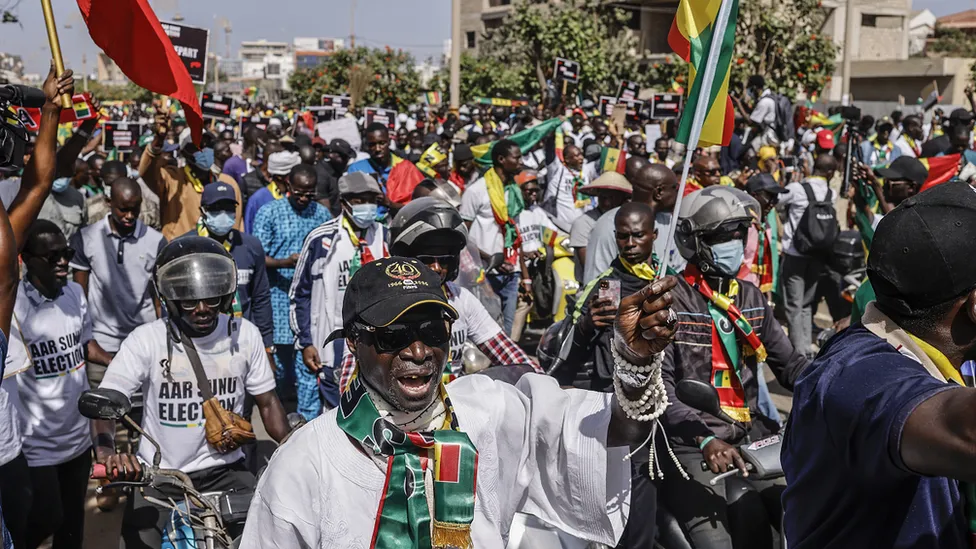
Senegal, which “is considered one of West Africa’s more stable democracies and is the only country in the region never to have had a military coup”, has recently been in the news, as its electoralist system is being shaken by the government’s attempt to postpone the upcoming elections.
Back in 2012, the Senegalese economist Ndongo Samba Sylla wrote the following assessment of the situation in Senegal (and elsewhere).
By praising the Senegalese “democratic” model, we are in fact glorifying an oligarchic system based on a legitimacy which, for its effectiveness, is no less artificial. This artificial character derives from the fact that the label “democratic” is conferred more by the certification of established political rating agencies than by an ability to really address the needs of the population. At a time when demagogic flights of fancy regarding the “Senegalese exception” are all the rage on the web, the most needy are quietly suffering in structural poverty which “democracy” will probably never pull them out of.
This is why it is necessary for us to be clear and precise in the language we use. If we want to resort to caricature and demagoguery, it is possible to extol the merits of the Senegalese model and in this way, to espouse the point of view of the elites. On the other hand, if it is truly the outcomes expected by the populations that matters, then it goes without saying that Senegal must change course. If “democracy” merely means that with this system, we more or less substitute economic violence for physical violence, it should be said immediately so that the matter is clear. So that the African populations know what they can expect, so that they know that “democracy” offers them the opportunity to replace despotism with the tyranny of the market that can be exercised by their “representatives”, so that they know that we offers them the least bad government for men reputed to be bad, because for constitutional liberalism, men are bad and can only have the right to at most the least bad governments. “Democracy” cannot promise anything more. It has never claimed to guarantee the democratic performance expected by the people. This is enshrined in its constitution.Under capitalism, “democracy” has only produced democratic outcomes in countries that are relatively sovereign, those that can protect their human and natural resources, those that can limit the influence of the market, as Karl Polanyi would have said. This situation does not hold everywhere. As long as Africans do not realize that the conquest of political power at the global level is the necessary condition, although not sufficient, for the democratic outcomes expected by the population, they will remain prisoners of illusions indefinitely.
Those who do not mind mediocrity can easily be satisfied with “democracy”, as Plato has remarked. On the other hand, those driven by a passion for justice should seek something other than “democracy”. If we are to change things, we must learn to think differently and distance ourselves from ambiguous concepts that lead to paralysis because they discourage the search for new alternatives.



“As long as Africans do not realize that the conquest of political power at the global level is the necessary condition, although not sufficient, for the democratic outcomes expected by the population, they will remain prisoners of illusions indefinitely.”
Whatevs
Typical intellectual bloviating
LikeLike
The question of the inter-state power structure is largely separate from the question of intra-state power structure, so it is not the main focus of the Sylla’s article. That said, the question of inter-state power is very important.
LikeLiked by 1 person
It’s just blather. Someone’s unhappy about the state of the world — as well they might be. So they come up with a revolutionary position and speak against ‘mediocrity’ and capitalism, and democracy as its experienced in the world. They’re not too specific about anything much, but it’s all very satisfying to say how much in favour of ‘justice’ you are.
LikeLike
> They’re not too specific about anything much
I am not sure what “specific about anything much” means (that itself is conveniently non-specific). The article does contain concrete claims such as that in the years 2000-2008 somewhere between 7.8% and 14.7% of Botswana’s GDP was transferred to multinational corporations as profits.
More broadly, this off-handed dismissal is rather unconvincing – “just blather” as you might say. Ignoring the effects of the inter-nation power structure, of capitalism and of colonialism on the situation in African countries (and indeed globally), or dismissing them as “someone’s unhappy” may be considered cool and down-to-earth in some circles but is not really a good argument.
LikeLike
You’re quite right Yoram, I didn’t dignify the article with an argument. I doubt arguing with you will achieve much. I’m happy to leave my comment for what reflection it might produce.
LikeLike
Makes sense. Since the feeling is mutual, let’s leave it at that.
LikeLike